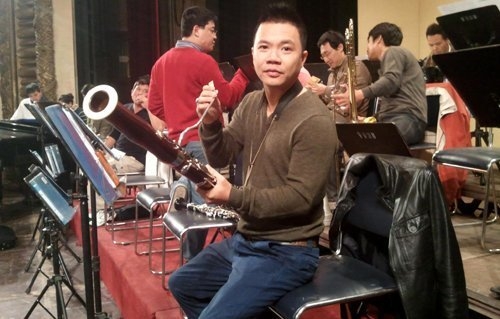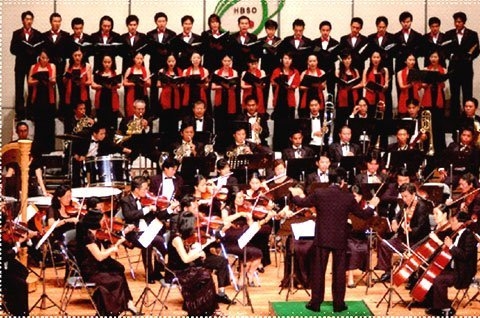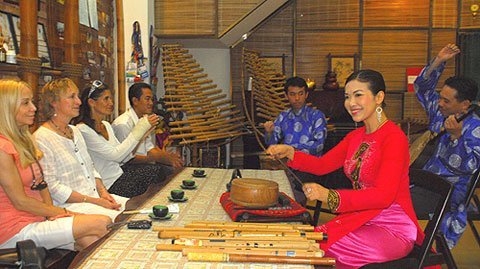|
Lip-sync singers earn highly, instrumentalists earn less than chars
VietNamNet
Bridge - While singers who live by scandals and lip-sync are paid
highly; there are instrumentalists accept dirt-cheap remuneration to
live and die with the job.
Super-income of singer'

Every day the news about the characters in the showbiz, especially
models, beauty queens and singer appears massively on the media. Readers
are fed up with the stupid mouthpiece, supercilious purse-proud of
those who are assumed to be famous. Stories of an actress who wore a
branded dress worth tens of thousands of US dollars or a model appeared
with a bag worth thousands of US dollars at an event are too familiar,
showing the showbiz’s showy world.
Several young singers who stepped out from music contests on television
asked for remuneration of several hundreds of US dollars for each show
and then they were detected to lip sync, but they immediately blamed it
on others. Meanwhile, instrumentalists had to sweat to practice in
several weeks for each performance received several tens of US dollars.
It is a paradox in the Vietnamese showbiz at present.
Among artists in Vietnam, singers are the ones who earn highest remuneration and in the easiest way.
Performing in a wedding of a rich family in the central province of Ha
Tinh, pop star Dam Vinh Hung was rumored to earn nearly VND500 million
($25,000) for about ten minutes.
Singer Thanh Lam confided that her remuneration is up to VND100 million
($5,000)/show. Other famous singers like Hong Nhung, My Linh, My Tam ...
are paid VND40-80 million ($2,000-$4,000)/show (usually with two
songs).
Some younger singers like Thu Minh, Tung Duong also surprise many people
when their remuneration is from VND70-90 million/show. Pop singers like
Ho Ngoc Ha, Uyen Linh, Thuy Tien, Le Quyen and Minh Hang are paid from
VND40 million to VND60 million/show.
He is not the best name in Vietnam but Duc Tuan earns around VND35-40
million/event. The remuneration for singers who specialized in
revolutionary songs like Trong Tan and Anh Tho is VND20-25 million/show,
which is considered quite low compared with pop singers.
Some contestants of The Voice now earn tens of thousands of US dollars a
month, such as Bui Anh Tuan, Dong Lan, Tieu Chau Nhu Quynh, Dinh Huong
and Huong Tram.
Unknown singers can earn from VND2-5 million/show, if they go to provinces.
Remuneration for a musical rehearsal not enough for a bowl of noodle

Tran Quang Vu has been a Fagott trumpet player of the Vietnam Opera
Ballet Theatre for 12 years. Previously, he studied at the Hanoi
Conservatory of Music for 14 years. Vu said he is lucky than others when
he has an official job upon graduation.
Choosing a difficult
musical instrument which is not popular at bars or private tutoring, Vu
can only played it in the orchestra. In addition to the theater's shows
(1-2 show each month), infrequently he plays for small shows at the
Hanoi Goethe Institute, earning dream remuneration of around VND1
million ($50)/show.
The remuneration for his shows at the Vietnam
Opera Ballet Theatre is from VND500,000 - VND1 million ($25-50)/show
while he has to practice for several weeks for each show. Working in the
Theatre for 12 years, until now his salary is VND3.5 million ($160) per
month, less than the income of a sidewalk tea seller or a char lady who
do not need to be trained for 14 years.
To pursue his passion
for music, like other musicians in his theatre, Vu has to do extra
works. He opened a cafe for two years and now he works as a show
director or a song writer. Compared to his extra jobs, which bring him
VND2-3 million ($100-150) for several days arranging an act, the earning
from his job at the theatre is obviously extremely cheap but he is
still sticking with it.
Vu’s colleagues also do extra jobs, which
have no relations to art. Some run bars and restaurants, some other
open studios or organize shows, perform at night clubs, events, etc.
Life
is so hard for them but they still strive for maintaining their
official job because "contrary with the sadness and anxiety of everyday
life, about cheap remuneration, the feeling after each performance is
indescribable. Those who follow this profession consider it not as a job
but the fate," Vu said.
Dirt-cheap remuneration from performances
held by their state-owned orchestras has forced many classical musicians
to earn their living in restaurants and hotels.

Cor trumpet artist Mai Quang Vinh, deputy dean of the trumpet-percussion faculty of the HCM City Conservatory of Music.
The image of musicians who plying their task among parties with drunk
guests is no longer strange to the Saigonese’s lifestyle. The truth that
everyone knows is that these noisy parties as the places where
classical musicians earn their living because their theaters cannot give
them a decent life.
Cor trumpet artist Mai Quang Vinh, deputy dean of the trumpet-percussion
faculty of the HCM City Conservatory of Music, said that classical
instrumentalists had a better life in the centrally-subsidized period.
They were supplied with milk and sugar and the allowances for “voice and
beauty maintenance.”
"In 1987, I graduated from the Prague Conservatory and returned home at
the time of doi moi (renovatin) and I was unemployed for seven years.
That time the city theatre did not perform, they used their theatre to
screen video films to serve the audience to make a living," Vinh
recalled.
In 1993, the HCM City Symphony Orchestra was founded, which is now the
HCM City Ballet Symphony Orchestra (HBSO). The HBSO and the HCM City
Conservatory of Music are currently the only two addresses with two
symphony orchestras, representing the academic musical life of the city
of more than 8 million residents.
At the time the HBSO was established, the remuneration prescribed by the
Ministry of Finance is VND10,000 for a day's training and VND30,000 for
a concert. Musicians who signed a contract with the theater were also
paid monthly salary prescribed by the State, which was very low.
"Each
year the remuneration increased a little. It rose to VND70,000 last
year and to VND80,000 ($4) this year for a rehearsal, and VND700,000
($35) for a concert for major musicians and VND630,000-650,000 ($30) for
supporting instrumentalists," said Vinh.

HBSO, one of the two orchestras of more than eight million people in Ho Chi Minh City.
The remuneration is too low so the show organizers often pay additional fees for artists.
Meanwhile, if they perform for the shows organized by private firms,
they will receive VND1 million ($50)/show or up to VND2.5 million ($120)
for a fashion show. However, such shows are not held often.
Even the shows of their theatres are not held often so most of musicians
earn their living from extra jobs such as tutoring or playing popular
pieces of music at restaurants, hotels or weddings.
From the perspective of a lecturer, Vinh said that the actual life of
many classical musicians make parents no longer want their children to
pursue this art.
The number of musicians who are trained systematically (usually it takes
over 11 years), who can stand in the orchestra is getting less. As a
result, HCM City’s symphony orchestra often lacks of staff and has to
use freelance for major programs.
Of course, one cannot simply blame the current difficulties of the
academic music on money and income matters but as the ancestors used to
say, "a hungry belly has no ears."
Lucio Degani, a violinist of the "I Solisti VENETI" orchestra (Italy)
revealed that musicians in Europe orchestras earn from Eur1000 to
Eur1800 Euro per month.
Famous violinist Xuan Huy said that his Chinese colleagues are paid about $2,500/month.
"Life of traditional musicians is adrift. Most of them are fed by
restaurants. They only play several popular pieces of music, not worth
their education."
That is the answer of Meritorious Artist Tuyet Mai, a famous dan tranh (16-chord zither) artist,
about the life of traditional music flow instrumentalists in HCM City
today. The cause of that situation is that traditional music troupes
cannot seek regular shows.
With a sensitive soul, nothing is more hurtful to the artist by using
their talent and skills, which is trained in ten of years at
conservatories, to "entertain" the crowd intoxicated guests.
The same for traditional instrumentalists

The hall of Meritorious Artists Tuyet Mai and Dinh Linh where introduces traditional music.
The story of the traditional instrumentalists also has a particular
aspect of a time when traditional values are exploited as a means of
cultural decoration for business.
Meritorious Artist Tuyet Mai said: "There are restaurants that only
asked us to be on the stage in traditional costumes and instruments, no
matter what we perform. Of course, I do not say that 100 percent of
restaurants like that and a few artists still play music passionately
regardless of the circumstances."
However, folk musicians not only bear the weight of daily life but also
the loneliness and ineptitude when they perform in front of crowds who
do not understand about traditional music. That fact makes them feel the
heavier responsibility: to preserve and spread the art of music of the
ancestors.
In her performances at universities, she was often asked a familiar
question of students "What kind of instrument with that sweet sound?"
She turned out the question and found the answer: "Why don’t many
Vietnamese listen to traditional music? Because they do not understand
it."
Tuyet Mai and her husband - Meritorious Artist Linh Dinh (flutist) found
a way to "save themselves" in terms of both economics and career. In
1992, they opened a traditional concert hall at the Thong Nhat
(Reunification) Palace for free and got revenue from the sale of
cassette tapes to survive.
After so many uncertainties and difficulties, the couple of traditional
instrumentalists have settled with a small concert hall named Truc Mai
House Music on Pham Viet Chanh Road, Binh Thanh District with "80
percent of customers being Western guests, who listen to Vietnamese
traditional music and buy CDs."
In addition to being the place to promote traditional music, Mai expects
that her hall to be a club for fans of traditional music. In the past
three years, she opened free training courses from July 15 to September
15.
Many people have questioned that two months of training is not enough to
teach one to play music but Mai said: "I did not have this ambition. I
honestly just want to help them understand the basics of traditional
music, call the right names of traditional musical instruments and
understand how to play nearly 30 instruments here. After two months,
they can play a folk song on a specific type of instrument. From here,
they will help me as a "propagandist" to spread love and understanding
of traditional music in life."
However, this is not the model for all artists. The problem of
traditional musicians is bigger and it must be the story of the State
and society.
Hoang Vy – Van Sam – Minh Chanh
|
Thứ Bảy, 20 tháng 4, 2013
Đăng ký:
Đăng Nhận xét (Atom)
Không có nhận xét nào:
Đăng nhận xét